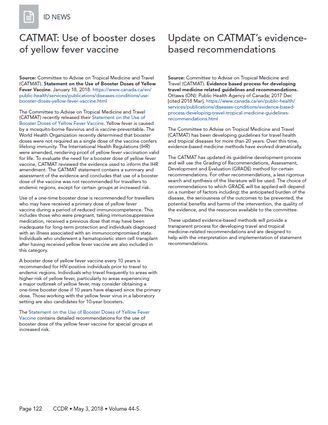Archived - CATMAT Yellow fever and Guidelines update

 Download this article as a PDF
Download this article as a PDF Published by: The Public Health Agency of Canada
Issue: Volume 44-5 : Emergency Response
Date published: May 3, 2018
ISSN: 1481-8531
Submit a manuscript
About CCDR
Browse
Volume 44-5, May 3, 2018: Emergency Response
ID News
CATMAT: Use of booster doses of yellow fever vaccine
Source: Committee to Advise on Tropical Medicine and Travel (CATMAT). Statement on the Use of Booster Doses of Yellow Fever Vaccine. January 18, 2018.
The Committee to Advise on Tropical Medicine and Travel (CATMAT) recently released their Statement on the Use of Booster Doses of Yellow Fever Vaccine. Yellow fever is caused by a mosquito-borne flavivirus and is vaccine-preventable. The World Health Organization recently determined that booster doses were not required as a single dose of the vaccine confers lifelong immunity. The International Health Regulations (IHR) were amended, rendering proof of yellow fever vaccination valid for life. To evaluate the need for a booster dose of yellow fever vaccine, CATMAT reviewed the evidence used to inform the IHR amendment. The CATMAT statement contains a summary and assessment of the evidence and concludes that use of a booster dose of the vaccine was not recommended for travellers to endemic regions, except for certain groups at increased risk.
Use of a one-time booster dose is recommended for travellers who may have received a primary dose of yellow fever vaccine during a period of reduced immunocompetence. This includes those who were pregnant, taking immunosuppressive medication, received a previous dose that may have been inadequate for long-term protection and individuals diagnosed with an illness associated with an immunocompromised state. Individuals who underwent a hematopoietic stem cell transplant after having received yellow fever vaccine are also included in this category.
A booster dose of yellow fever vaccine every 10 years is recommended for HIV-positive individuals prior to travel to endemic regions. Individuals who travel frequently to areas with higher risk of yellow fever, particularly to areas experiencing a major outbreak of yellow fever, may consider obtaining a one-time booster dose if 10 years have elapsed since the primary dose. Those working with the yellow fever virus in a laboratory setting are also candidates for 10-year boosters.
The Statement on the Use of Booster Doses of Yellow Fever Vaccine contains detailed recommendations for the use of booster dose of the yellow fever vaccine for special groups at increased risk.
Update on CATMAT's evidence-based recommendations
Source: Committee to Advise on Tropical Medicine and Travel (CATMAT). Evidence based process for developing travel medicine related guidelines and recommendations. Ottawa (ON): Public Health Agency of Canada; 2017 Dec [cited 2018 Mar].
The Committee to Advise on Tropical Medicine and Travel (CATMAT) has been developing guidelines for travel health and tropical diseases for more than 20 years. Over this time, evidence-based medicine methods have evolved dramatically.
The CATMAT has updated its guideline development process and will use the Grading of Recommendations, Assessment, Development and Evaluation (GRADE) method for certain recommendations. For other recommendations, a less rigorous search and synthesis of the literature will be used. The choice of recommendations to which GRADE will be applied will depend on a number of factors including: the anticipated burden of the disease, the seriousness of the outcomes to be prevented, the potential benefits and harms of the intervention, the quality of the evidence, and the resources available to the committee.
These updated evidence-based methods will provide a transparent process for developing travel and tropical medicine–related recommendations and are designed to help with the interpretation and implementation of statement recommendations.